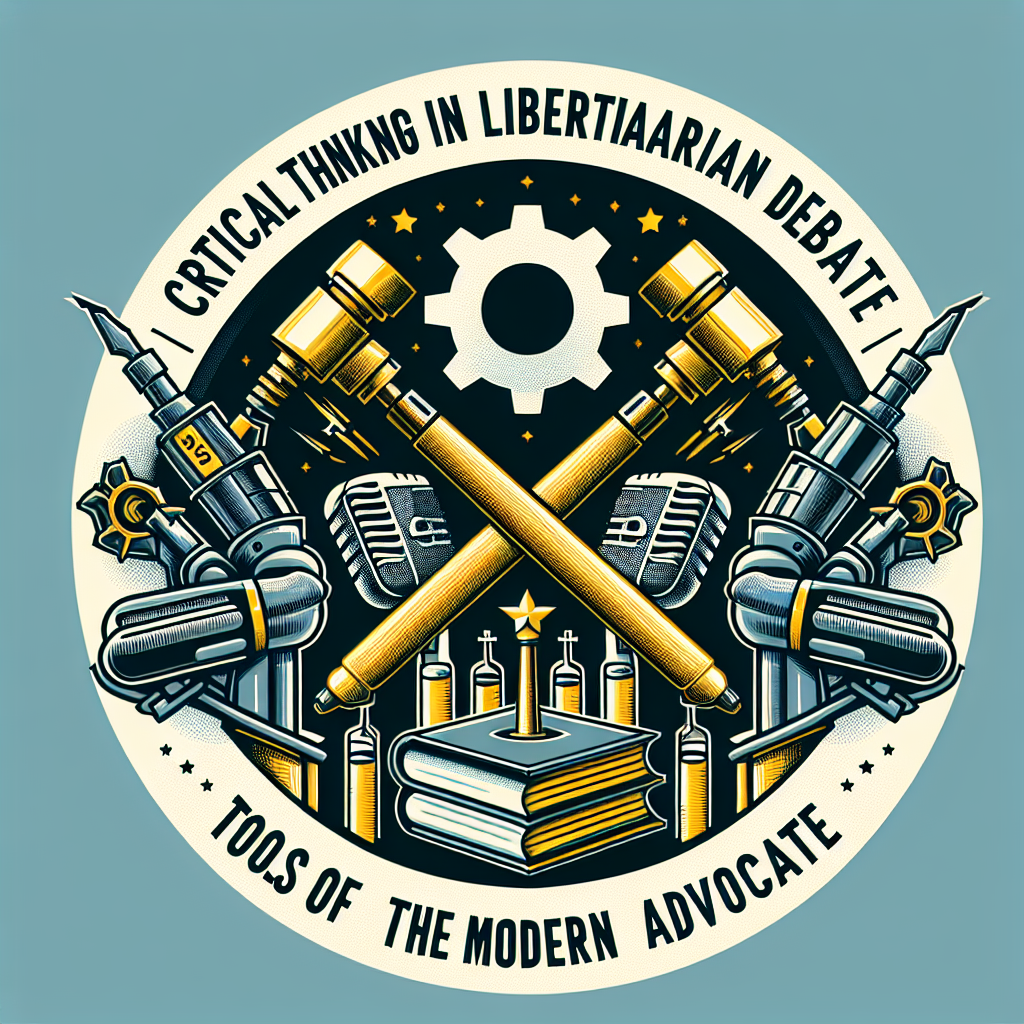Critical Thinking in Libertarian Debate: Tools for the Modern Advocate
In today’s increasingly polarized political landscape, the ability to engage in constructive debate and articulate libertarian principles is more vital than ever. Critical thinking serves as a powerful tool for advocates, helping them dissect arguments, approach discussions analytically, and effectively communicate ideas. This article delves into the essential elements of critical thinking in the context of libertarian debate, offering valuable resources and techniques for modern proponents.
Understanding Critical Thinking: What It Is and Why It Matters
Critical thinking is the ability to think clearly and rationally, analyzing arguments and identifying biases. In libertarian debate, this skill is crucial as it allows advocates to challenge opposing viewpoints, bolster their arguments, and engage with others constructively. By honing critical thinking skills, libertarian advocates can present their principles intelligently and engagingly, fostering understanding and potentially changing minds.
The Importance of Logic in Libertarian Debates
Logic forms the foundation of all critical thinking. In libertarian discussions, where economic policies and personal freedoms are often intertwined, employing logical reasoning is essential. Advocates must distinguish between sound arguments and fallacies, ensuring their positions are persuasive and well-grounded.
- Example of Logical Fallacies: One common fallacy in political debates is the straw man argument, where an opponent’s position is misrepresented to make it easier to attack. Libertarian advocates should learn to identify and counter such tactics to maintain the integrity of their arguments.
Tools for Enhancing Critical Thinking Skills
Advocates can utilize several key tools to enhance their critical thinking abilities in libertarian debates:
1. Socratic Questioning
Socratic questioning involves asking a series of probing questions that challenge assumptions and lead to deeper understanding. This method can be employed effectively in libertarian debates to unravel complex issues surrounding individual liberty and government intervention. Ask questions like:
- What are the underlying assumptions of your argument?
- How does this policy align with or contradict libertarian principles?
- What evidence supports this claim?
2. Research and Data Analysis
Incorporating data-driven research can significantly strengthen libertarian arguments. Utilize resources such as academic databases, think tanks, and reputable news sources to gather evidence that supports libertarian principles. Analyze data critically to identify trends, biases, and correlations that can bolster your arguments.
3. Constructive Dialogue Techniques
The art of constructive dialogue is essential in libertarian debates. Techniques such as active listening, empathizing with opposing views, and validating others can create a more positive environment. A respectful tone encourages open discussion and reduces defensiveness, making it easier to share and debate differing viewpoints.
The Role of Emotional Intelligence in Debate
Emotional intelligence involves understanding and managing one’s own emotions while empathizing with others. Advocates must recognize that libertarian debates can become heated and emotionally charged. Developing emotional intelligence can help ensure discussions remain respectful and productive. Key areas to focus on include:
- Self-awareness: Acknowledge your biases and emotional responses.
- Empathy: Understanding the concerns of others can aid in addressing their fears regarding libertarian policies.
- Conflict resolution: Learning to navigate disagreements can foster more constructive conversations.
Strategies for Practicing Critical Thinking
Regular practice is essential for refining critical thinking skills. Here are some strategies for libertarian advocates to consider:
1. Engage in Structured Debates
Participating in formal debates, whether in academic settings or local clubs, can sharpen critical thinking skills. Choose topics that matter to the libertarian movement, allowing you to practice articulating arguments while learning from opponents.
2. Read Widely and Diversely
Expanding your reading list to include diverse perspectives enhances critical thinking. While it’s essential to understand libertarian literature, reading opposing viewpoints can refine your arguments and expose you to new ways of thinking.
3. Reflect on Past Debates
After engaging in a debate, take the time to reflect on what went well and what could be improved. Analyze your performance, note any moments where critical thinking could have been applied more effectively, and formulate plans to refine these skills for future discussions.
Conclusion: Becoming a Modern Libertarian Advocate
Critical thinking is not just a desirable skill for libertarian advocates; it is essential for effective communication and meaningful debate. By embracing techniques such as Socratic questioning, data analysis, and emotional intelligence, advocates can enhance their arguments and foster engaging discussions. As you refine these skills, you contribute to a broader understanding of libertarian principles, ultimately advocating for individual liberty and personal responsibility in an increasingly complex world.
By integrating critical thinking into libertarian debate, modern advocates can ensure that their message not only resonates but also inspires thoughtful dialogue and impactful change.
Share this content:












Post Comment